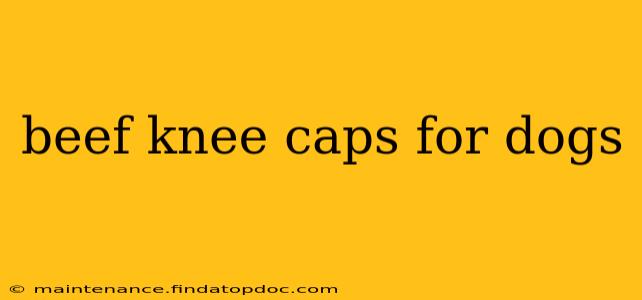Beef knee caps, also known as beef knuckles, are a popular and nutritious dog treat. They offer a unique combination of benefits, from dental health to mental stimulation, but it's crucial to understand how to select, use, and potentially mitigate any risks associated with them. This guide will explore everything you need to know about beef knee caps for your canine companion.
What are Beef Knee Caps?
Beef knee caps are essentially the cartilage and bone from a cow's knee joint. They are a natural chew that provides a long-lasting, satisfying experience for dogs. They're often sourced from human-grade beef, meaning they meet rigorous safety standards. However, it is essential to ensure you're sourcing from reputable suppliers who prioritize quality and safety.
Are Beef Knee Caps Safe for Dogs?
Generally, beef knee caps are considered safe for dogs, but with some important caveats. Always supervise your dog while they are chewing on a beef knee cap. These chews are hard and can potentially cause broken teeth or other oral injuries if chewed aggressively. Additionally, monitor your dog for any signs of digestive upset such as vomiting or diarrhea. Large pieces can potentially create a choking hazard, so it’s vital to ensure appropriately sized pieces for your dog's breed and size.
Finally, avoid giving beef knee caps to dogs with pre-existing dental issues or sensitive stomachs. If you have any concerns, consult your veterinarian before introducing this treat into your dog's diet.
What are the Benefits of Beef Knee Caps for Dogs?
Beef knee caps offer several potential benefits:
- Dental Health: The chewing action helps to scrape away plaque and tartar buildup, promoting cleaner teeth and healthier gums. However, it's not a replacement for regular professional dental cleanings.
- Mental Stimulation: Chewing provides mental enrichment and helps to alleviate boredom, particularly for dogs prone to destructive chewing. This can reduce anxiety and destructive behaviors.
- Joint Health (Indirectly): While the knee cap itself doesn't directly impact joint health, the glucosamine and chondroitin naturally present in the cartilage contribute to overall joint support. However, the amount is relatively small compared to dedicated joint supplements.
- Long-lasting Chew: They tend to be a more durable chew than many other options, providing extended chewing pleasure.
What Size Beef Knee Cap Should I Choose for My Dog?
The size of the beef knee cap should always be appropriate for your dog's size and chewing habits. Small dogs should only receive smaller knee caps, while larger breeds can handle larger ones. A rule of thumb is to choose a size your dog can comfortably manage without struggling or swallowing large chunks. Always supervise your dog during chewing.
How Often Should I Give My Dog Beef Knee Caps?
Beef knee caps should be given as an occasional treat, not a regular part of your dog's diet. Overfeeding can lead to digestive issues. How often you give them will depend on your dog's size, chewing habits, and overall health. Consult with your veterinarian for tailored advice based on your dog's specific needs.
Can Beef Knee Caps Cause Digestive Problems?
While generally safe, beef knee caps can cause digestive upset in some dogs, especially if consumed in large quantities or if the dog is prone to sensitive stomachs. Monitor your dog for signs of vomiting, diarrhea, or changes in bowel movements. If you notice any digestive problems, discontinue use and consult your veterinarian.
Are There Alternatives to Beef Knee Caps?
Yes, there are many other safe and healthy chews available for dogs, including bully sticks, yak chews, and dental chews designed for specific dental health benefits. These offer various textures and benefits, allowing you to find the best option for your dog's preferences and needs. Always choose treats from reputable sources that prioritize quality and safety.
Conclusion
Beef knee caps can be a valuable addition to your dog's treat repertoire, offering dental and mental stimulation benefits. However, responsible selection, supervision, and monitoring for potential side effects are crucial. Choosing the right size, limiting frequency, and being aware of potential digestive issues ensures a safe and enjoyable experience for your beloved canine companion. Always consult your veterinarian with any concerns about your dog's diet or health.
